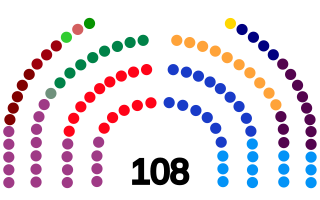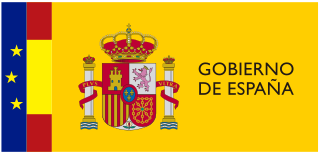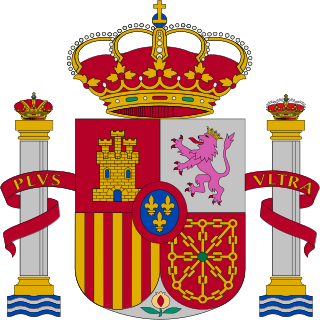In a parliamentary or semi-presidential system of government, a reserve power, also known as discretionary power, is a power that may be exercised by the head of state without the approval of another branch or part of the government. Unlike in a presidential system of government, the head of state is generally constrained by the cabinet or the legislature in a parliamentary system, and most reserve powers are usable only in certain exceptional circumstances.

The prime minister of Spain, officially president of the Government, is the head of government of Spain. The prime minister nominates the ministers and chairs the Council of Ministers. In this sense, the prime minister establishes the Government policies and coordinates the actions of the Cabinet members. As chief executive, the prime minister also advises the monarch on the exercise of their royal prerogatives.

The Spanish Constitution is the supreme law of the Kingdom of Spain. It was enacted after its approval in a constitutional referendum; it represents the culmination of the Spanish transition to democracy.

The Congress of Deputies is the lower house of the Cortes Generales, Spain's legislative branch, the upper house being the Senate. The Congress meets in the Palace of the Parliament in Madrid.

The Cortes Generales are the bicameral legislative chambers of Spain, consisting of the Congress of Deputies and the Senate.

The Congress of the Republic of Colombia is the name given to Colombia's bicameral national legislature.

The Political Constitution of the Spanish Monarchy, also known as the Constitution of Cádiz and as La Pepa, was the first Constitution of Spain and one of the earliest codified constitutions in world history. The Constitution was ratified on 19 March 1812 by the Cortes of Cádiz, the first Spanish legislature that included delegates from the entire nation and its possessions, including Spanish America and the Philippines. "It defined Spanish and Spanish American liberalism for the early 19th century."

The government of Spain is the central government which leads the executive branch and the General State Administration of the Kingdom of Spain.

The Parliament of Catalonia is the unicameral legislature of the autonomous community of Catalonia. The Parliament is currently made up of 135 members, known as deputies, who are elected for four-year terms or after extraordinary dissolution, chosen by universal suffrage in lists of four constituencies, corresponding to the Catalan provinces. The Parliament building is located in Ciutadella Park, Barcelona.

Andalusian nationalism is the nationalism that asserts that Andalusians are a nation and promotes the cultural unity of Andalusians. In the past it was considered to be represented primarily by the Andalusian Party, however, the party disbanded in 2015. In 2021, the left-wing Andalusian nationalist party Adelante Andalucía was formed, obtaining representation in the 2022 regional election.

The Political Constitution of 1899, informally known as the Malolos Constitution, was the constitution of the First Philippine Republic. It was written by Felipe Calderón y Roca and Felipe Buencamino as an alternative to a pair of proposals to the Malolos Congress by Apolinario Mabini and Pedro Paterno. After a lengthy debate in the latter part of 1898, it was promulgated on January 21, 1899.

The president of the Congress of Deputies is the speaker of the Congress of Deputies, the lower house of the Cortes Generales. The president is elected among the members of the Congress and is, after the king and the prime minister, the highest authority in the Kingdom of Spain.

The president of the Senate is the presiding officer of the Spanish Senate, the upper house of Spain's Cortes Generales. It is the fourth authority of the country after the Monarch, the Prime Minister and the President of the Congress of Deputies. The president is elected among and by the incumbent senators. When the president is unable to exercise power, vice presidents of the Senate exercise the powers of the Senate president.

Emilio Attard Alonso was a Spanish politician.
The royal prerogative is a body of customary authority, privilege, and immunity recognized in common law as belonging to the sovereign, and which have become widely vested in the government. It is the means by which some of the executive powers of government, possessed by and vested in a monarch with regard to the process of governance of the state, are carried out.

María Soraya Rodríguez Ramos is a Spanish lawyer and politician who has been serving as a Member of the European Parliament for Ciudadanos since 2019. She previously was a Deputy of the PSOE in the Congress of Deputies.

Amparo Rubiales Torrejón is a Spanish politician who belongs to the political party PSOE and is ex-counsellor of the Junta de Andalucía. She holds a PhD in Laws, and is a lawyer and Senior Lecturer of Administrative Law at the University of Seville.

The Bureaus of the Cortes Generales are the governing bodies of each House of the Cortes Generales, the legislative branch of Spain. The Bureaus are made up of the President or Speaker of the House, the Vice Presidents or Deputy Speakers and the Secretaries. Each Bureau is regulated by the standing orders of its house.

The Board of Spokespersons (Spanish: Junta de Portavoces, is a parliamentary body of each house of the Cortes Generales and is a council of party representatives mainly entrusted with the task of advising the Bureau on the agenda of the Parliament. The Board also decides on the composition of parliamentary committees.

Parliamentary groups in Spain are the institutionalisation or parliamentarisation, of political parties.


















